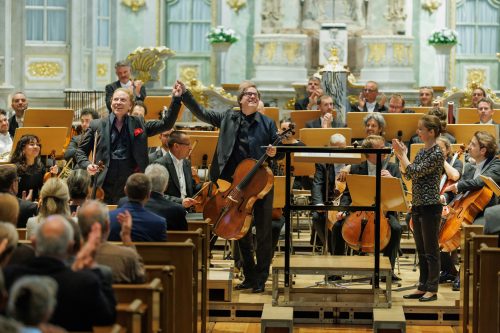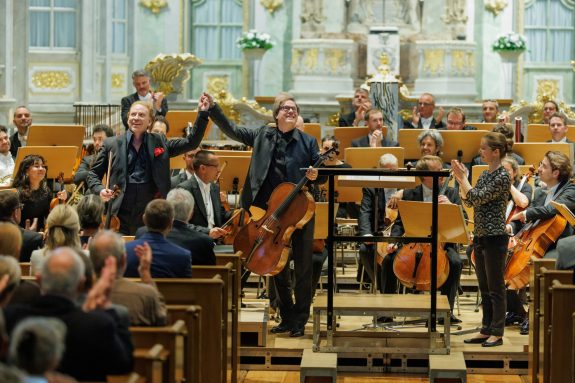
 Germany Dresden Music Festival 2024 [9] – Price, Rózsa, Williams, Rózsa and Tchaikovsky: Daniel Hope (violin), Jan Vogler (cello), Deutsches Symphonie-Orchester Berlin / Anna Rakitina (conductor). Frauenkirche, Dresden, 28.5.2024. (MC)
Germany Dresden Music Festival 2024 [9] – Price, Rózsa, Williams, Rózsa and Tchaikovsky: Daniel Hope (violin), Jan Vogler (cello), Deutsches Symphonie-Orchester Berlin / Anna Rakitina (conductor). Frauenkirche, Dresden, 28.5.2024. (MC)

Florence Price – ‘Adoration’ (arr. for string orchestra by Peter Simcich)
Miklós Rózsa – Prelude and Love Theme from film Spellbound (1945) (arranged for violin and orchestra by Paul Bateman); Sinfonia Concertante for violin, cello and orchestra, Op.29
John Williams – Theme from film Schindler’s List (1993) (arr. for cello and orchestra)
Tchaikovsky – Symphony No.5 in E minor, Op.64 (1888)
Held in the spectacular Frauenkirche, Dresden, this felt like two separate concerts from the visiting Deutsches Symphonie-Orchester Berlin (DSO Berlin). The first half served as a tribute to the film music of Hollywood and the second half was given over to Tchaikovsky’s Symphony No.5, a key work of the Romantic repertoire.
Hungarian American composer Miklós Rózsa was awarded three Oscars for his film work, his best-known score being Ben-Hur (1959). In this concert Rózsa was represented by two works, the first ‘Prelude and Love Theme’ from his score to Alfred Hitchcock’s psychological thriller Spellbound (1945). Soloist Daniel Hope played Paul Bateman’s arrangement for violin and orchestra. In the violin’s upper register Hope was in his element with the meltingly beautiful love theme.
Out of Queens, New York City, John Williams is America’s most successful living composer of film music and the recipient of numerous awards. Likely his best-known score was from George Lucas’s blockbuster film Star Wars (1977) plus others such as, Jaws, Jurassic Park and Indiana Jones. Steven Spielberg’s epic WWII film Schindler’s List (1993) concerning the Nazi’s genocide of Jews was a great success, undoubtedly assisted by John Williams’s elegiac score. Here cellist Jan Vogler played the much-loved ‘Theme’ from Schindler’s List in an arrangement for cello and orchestra. Played with considerable expression, Vogler succeeded in heightening the tension of this heart-rending score.
Rózsa’s Sinfonia Concertante for violin, cello and orchestra was written in 1958 for the pair of Jascha Heifetz and Gregor Piatigorsky, yet the esteemed duo never did perform the piece. A difficult work to bring off in concert Hope and Vogler saw this as a close dialogue not always a subtle one. Using original Hungarian folk themes, the middle movement a theme and set of five well differentiated variations, came off especially well. Clearly feeding off each other, the performance of Hope and Vogler was a meeting of minds. Time seemed just to fly by, and how the audience cheered and cheered.
Not inspired by film music, a rediscovered work from Florence Price opened the concert. Price a former student of the New England Conservatory of Music has become the first African American female composer to achieve national acclaim. Written in the 1950s and thought lost ‘Adoration’ a piece for organ was found amongst Price’s papers in 2009. We heard the arrangement of ‘Adoration’ prepared for string orchestra by Peter Simcich. Moscow born conductor Anna Rakitina treated the performance with care and sincerity.
After the interval Tchaikovsky’s Fifth Symphony took centre stage. A highly personal work, Tchaikovsky was experiencing a deep depression that knocked his confidence and was feeling physically unwell when commencing work on the symphony. Still preying on his mind was the mixed reception given to his Fourth Symphony a decade earlier. Premiered in 1888 in Saint Petersburg, Tchaikovsky’s Fifth Symphony received considerable acclaim, yet the composer still had misgivings though most were unfounded.
In the Fifth the outstanding playing of the DSO Berlin under Anna Rakitina evoked a voyage that commenced in the shadows and concluded with the soaring light of redemption. The orchestra will know this work well and it felt and looked as if Rakitina was guiding with empathy rather than issuing commands. The playing was unified, and the range of expression achieved was wide. Considering the acoustic of the Frauenkirche can be quirky the orchestral sound felt well focused, and the woodwind and brass sections excelled.
The first half of this Frauenkirche concert featuring Daniel Hope and Jan Vogler provided tremendous entertainment. In the second half the audience were treated to a highly satisfying performance of Tchaikovsky’s Fifth Symphony.
Michael Cookson
